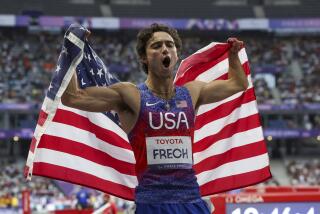Olympic Gold Is No Guarantee of Green
- Share via
Gymnast Shannon Miller’s palms are still coated with chalk. Swimmer Summer Sanders’ fingers are still wrinkled from her hours in the pool. But already the two athletes, along with dozens of their teammates on the U.S. Olympic team are being eyed, evaluated and--occasionally, very occasionally--approached by promoters of soda, sneakers and sundry other products.
For Miller, who won a silver medal in the all-around gymnastics competition, and Sanders, who won a gold in the 200-meter butterfly, their medals may well translate into marketing success.
But in an age where advertising has been clipped by the recession and where marketers have grown wary of betting millions on soon-to-be-disqualified athletes, Miller and Sanders are exceptions to the rule.
“People expect a lot of advertising to come out of the Olympics,” said David Burns, president of Burns Sports Celebrity Service, Chicago. “But when it’s all shaken out, not that many ads will come of it.”
One important pressure advertisers face in signing on new Olympic stars is the short-lived nature of their fame. Unlike professional athletes who play on basketball, baseball or football teams, many Olympians who suddenly find themselves in the limelight return to anonymity just as quickly.
“A lot of these athletes participate in sports that don’t exactly have top-of-mind awareness year-round for most consumers,” said John Wolfe, New York bureau chief for Advertising Age. “Something like the decathlon you only hear about once every four years.”
That short shelf life may explain why so many traditionally trendy manufacturers have chosen not to enter this year’s Olympic marketing competition.
Coca-Cola Co., for example, has no plans to sign any of this year’s Olympians to endorse the soft drink, according to company spokesman Randy Donaldson.
The one former Olympian Donaldson did recall the company contracting with was Evander Holyfield--but Holyfield’s Coca-Cola contract came with his world heavyweight boxing title in 1990, not the 1984 Olympic match from which he was disqualified.
In those cases where advertisers do decide to take a chance on a new Olympic face, the potential gains, like the potential losses, are great.
A previously unknown gymnast such as Miller will probably earn about $50,000 for a major endorsement campaign, industry experts say. From an advertiser’s point of view, that figure compares very favorably to the $150,000 to $200,000 that a more familiar Olympian, such as Jackie Joyner-Kersee, might command for the same campaign. And even Joyner-Kersee’s fee pales beside the going rate for an endorsement from one of the promotion-weary members of the men’s basketball “Dream Team,” such as Michael Jordan.
But time is of the essence when signing one of the most recent crop of Olympic stars. To capitalize on the Olympians’ abbreviated fame while consumers still remember who won the medals, advertisers have to move quickly--first in signing the athletes, then in producing the spots.
“It’s not as though you win a medal with a contract stapled to it,” said Alan Gottesman, a media analyst for Paine Webber. “You need time to negotiate.”
But for Burns, whose company represents advertisers looking for sports celebrities, the negotiating process is accelerated during the Olympics. “The calls usually come in within two weeks after you win the gold,” Burns said. “After that, it tapers off.”
Only seven days after the Games began, at least one of Burns’ clients has already negotiated a contract with an Olympian. To speed the process of assembling the television commercial, Burns said, the company is using footage from the Barcelona competition in the spot, rather than shooting it from scratch.
That sort of excitement about Olympic competition is often limited to certain sports and to certain athletes, however.
This year, few medal winners have captured the public’s eyes as much as past stars like Bruce Jenner, Mark Spitz or Mary Lou Retton. “There’s no real hero or heroine yet,” said Burns, “just a lot of people standing on the podium.”
The closest to a single Olympic star that many say they have seen emerge this year is Joyner-Kersee, who won a gold medal in the heptathlon Sunday. But her marketing potential may be limited by the relative obscurity of the seven-event competition in which she triumphed.
“The interest in track and field in not as high as in swimmers, divers and gymnasts,” Burns said. “More people stay tuned in for those sports.”
Joyce Julius-Cotman, president of Joyce Julius & Associates, a group of sports marketing analysts, agreed that Olympian endorsers usually came from “glamour sports that people are in love with,” such as diving and gymnastics. But even those Olympic luminaries enjoy a relatively short shelf life.
“You only get one time on the Wheaties box,” Julius-Cotman said. “Even with Mary Lou Retton, McDonald’s didn’t use her any more than a year.”
And so while the tally of U.S. medals rises and each event heralds another fresh face with promotional promise, some advertisers are following the games with a sobering realism.
“Next week it will all be over,” Burns said, “and these people will be out of the news.”
More to Read
Go beyond the scoreboard
Get the latest on L.A.'s teams in the daily Sports Report newsletter.
You may occasionally receive promotional content from the Los Angeles Times.






